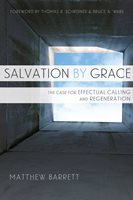About the Author
Matthew Barrett (PhD, The Southern Baptist Theological Seminary) is assistant professor of Christian studies at California Baptist University and executive editor of Credo Magazine.
Introduction
This book is a fresh examination of the debate between monergism and synergism, specifically focusing on the nature of effectual calling. The integral nature of total depravity, effectual calling, election, and regeneration is carefully explored. Barrett argues that the Scriptures teach effectual calling as is represented in the Reformed tradition. Effectual calling precedes regeneration and is empowered by grace that is irresistible. Since it is irresistible, and not all are saved, it is only applied to the elect. The bulk of the book’s content deals with exegesis and the theological conclusions that are deduced from various passages.
Barrett interacts with Arminian theology and exegesis, particularly in regards to the issue of prevenient grace. He also examines the nature of libertarian free will and concludes that the Arminian view is unsustainable both biblically and philosophically. Arminian logic and interpretation is compared with Calvinist logic and interpretation, and some attempts to chart middle ways between the two are examined as well.
Table of Contents
Foreword: Bruce Ware and Thomas Schreiner
Introduction: The Contemporary Debate
Chapter 1 Monergism in the Calvinist Tradition
Chapter 2 Total Depravity and the Bondage of the Will
Chapter 3 The Scriptural Affirmation of Effectual Calling
Chapter 4 The Scriptural Affirmation of Monergistic Regeneration
Chapter 5 Arminian Synergism in Theological Perspective
Chapter 6 The Inadequacy of Arminian Synergism
Chapter 7 The Failure of Recent Attempts at a Middle Way
Conclusion
Summary
Chapter 1
Monergism in the Calvinist Tradition
Although contemporary evangelicalism associates predestination and sovereign grace with John Calvin, Calvin’s theology was heavily influenced by Augustine. Debates concerning Augustinianism, Pelagianism, Semi-Pelagianism, and Semi-Augustinianism continue today. Augustine believed that human beings were totally depraved and that their wills were enslaved to sin. People were responsible moral agents, but were not able not to sin. Their free will was in bondage. God in sovereign grace chose to liberate the wills of the sinners in whom he chose to work. Since nobody was able to choose to follow God, he had to choose to grant his elect the gift of faith. Augustine’s view was monergistic. He believed that God’s work of saving, electing grace was always efficacious. Pelagius rejected original sin and maintained that the will was unaffected by inherited corruption. People retained free choice, so assisting grace was — strictly speaking — unnecessary. He argued that God’s grace was resistible. Pelagius’s view was monergistic as well, except his view was of a human monergism, whereas Augustine’s was of divine monergism. Semi-Pelagianism posits a human-initiated synergism (where God responds to the will). Semi-Augustinianism posits a synergism that is initiated by God (God gives universal, prevenient grace).
Between the time of Augustine and the Reformation …
[To continue reading this summary, please see below....]
The remainder of this article is premium content. Become a member to continue reading.
Already have an account? Sign In
